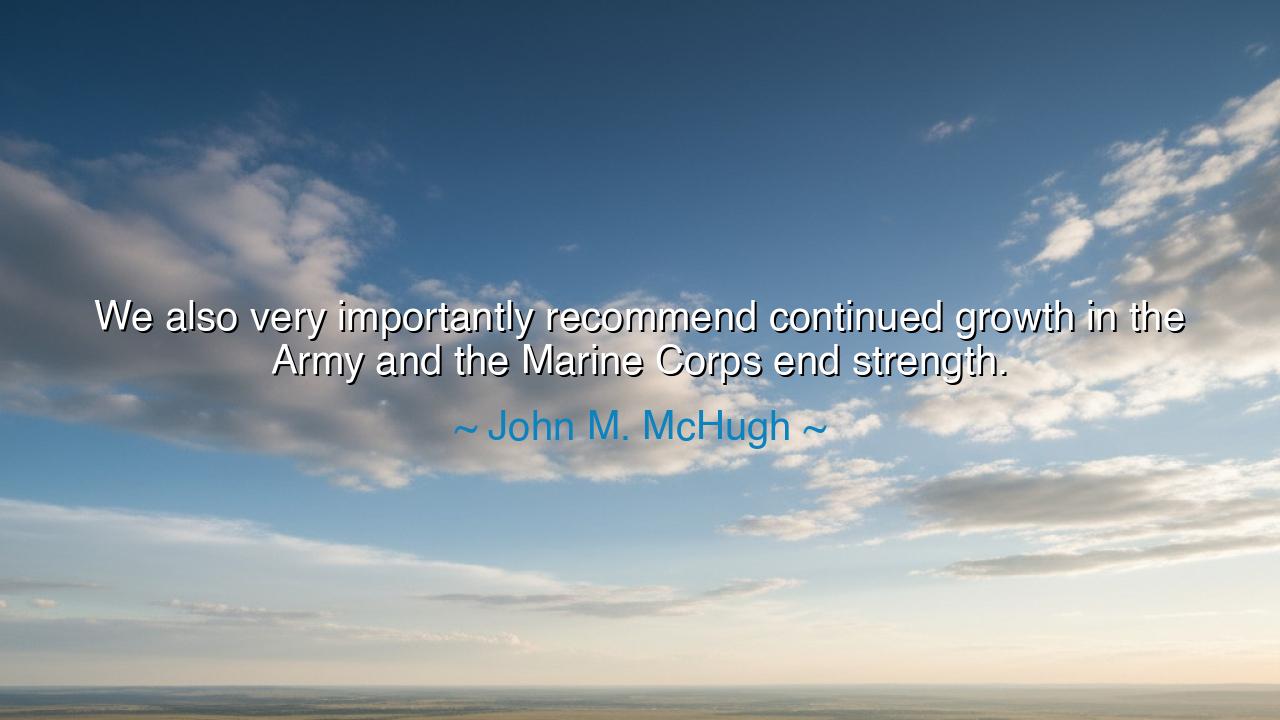
We also very importantly recommend continued growth in the Army
We also very importantly recommend continued growth in the Army and the Marine Corps end strength.






The words of John M. McHugh—“We also very importantly recommend continued growth in the Army and the Marine Corps end strength”—resound with the gravity of nations and the weight of history. They are not merely the counsel of a statesman; they are a reminder of an eternal truth: that the safety of a people rests upon the vigilance and fortitude of its defenders. To speak of growth in strength is not to glorify war, but to acknowledge that peace itself must be guarded by those willing to stand in the breach when shadows rise.
From the dawn of civilization, kingdoms have known that the shield must be kept strong if the plow is to remain in the field. The farmers of Rome could till their soil because the legions watched the frontiers; the merchants of Athens could sail their ships because the hoplites stood firm in phalanx. In McHugh’s call for continued growth of the Army and Marines, there echoes the ancient principle that a people’s prosperity rests upon their ability to defend it. For without strength, liberty falters; without guardians, the gates of civilization are left open to chaos.
Consider the tale of the Battle of Thermopylae, when a mere band of Spartans, joined by allies, held the pass against the vast host of Persia. They were not many, but they were trained, disciplined, and bound by duty. Their stand did not halt the tide forever, but it bought precious time, and their courage inspired Greece to rally. This story illustrates what McHugh himself points toward: that end strength—the number and readiness of warriors—is not a trivial measure of policy, but the very heartbeat of national survival. It is not only the steel of weapons, but the will of men and women, multiplied and sustained, that preserves a nation.
Yet strength is not static; it must grow. Just as a tree that ceases to grow begins to wither, so too do armies that stand still while the world changes. McHugh’s words came in an era when new threats arose, both known and unforeseen. The seas still carried dangers, the deserts and mountains still harbored foes, and the horizon still shimmered with uncertainty. Thus his call was not merely for numbers, but for resilience, adaptability, and the assurance that when the trumpet sounded, the guardians of the republic would be many and ready.
The meaning of his counsel goes beyond the field of war. To the wise, it teaches a broader lesson: in all things that must be preserved—family, community, virtue—continued growth is essential. To stand still is to invite decay. As the soldier must train daily to remain strong, so must the spirit of each person cultivate strength, discipline, and unity. For just as the Army and Marines safeguard a nation, so too must individuals guard the sanctuaries of their own lives.
The lesson is clear: do not wait until the storm breaks to build your shelter. Strength, whether of body, mind, or community, must be cultivated in times of peace so it is ready in times of trial. The ancients taught that fortune favors the prepared; McHugh’s words are but a modern echo of this eternal law. End strength is not only the measure of soldiers in arms, but also the measure of resolve in the hearts of a people.
Therefore, let each who hears these words take them to heart. Nurture your own strength—train your body, sharpen your mind, deepen your faith. Fortify your household as the state fortifies its armies. Build communities bound by trust and duty, so that when adversity comes, you are not found wanting. Just as nations depend upon their defenders, so do lives depend upon the unseen preparation of each soul.
In the end, McHugh’s declaration is both a policy and a parable. For generations to come, let it be remembered: to preserve peace, one must prepare for trial. To sustain liberty, one must guard it with vigilance. And to live with courage, one must never cease to grow in strength, whether as a warrior on the field or as a guardian of one’s own destiny.






AAdministratorAdministrator
Welcome, honored guests. Please leave a comment, we will respond soon